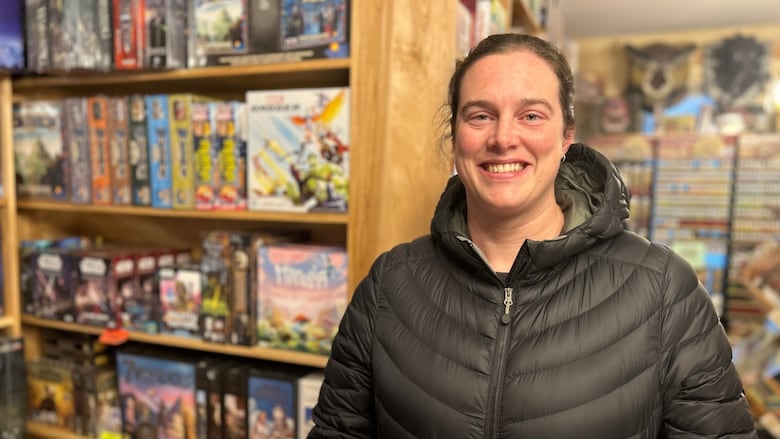Focus on gifts or experiences for children that spark creativity this holiday season
Puzzles, real-world experiences good for child's development in device-dominated world, psychologist says

Jessica Bossé enjoys playing board games with her children and plans to put a few new ones under the Christmas tree this year.
Her six-year-old will often pair up with an adult, while her 10-year-old plays independently.
"Once he sees that he's understanding the rules, and he's playing competitively, you can see that he gained some confidence with that and gets excited about it," Bossé said.
She said her family is working on skills such as critical thinking, teamwork and communication — skills some experts feel are in short supply among young people today.

Skills like time management and adaptability, and interpersonal relationships are crucial for young people to develop early on. But a rise in technology use means less time spent with face-to-face interaction and fewer opportunities to practise those skills.
Fredericton psychologist Laurel Richmond said problem solving and stress management skills are particularly lacking.
"We're really in a crisis here," Richmond said. "We need kids to be able to practise these things. So we need to get them off the devices and into real world experiences and kind of coach them through it — like how to write a letter or how to say thank you or how to make eye contact with somebody."
Richmond said parents should take advantage of the holiday season to focus on more active engagement, such as board games, hikes or adventures with the family, or a sport that everyone can play together.
For her, those experiences are more important than gifts under the tree.
"Situations where they have those opportunities to bond with people, to make those connections and practise those social skills is going to be really critical," she said.
Richmond said young people are missing opportunities to grow and communicate in everyday experiences, with their heads down scrolling on their phones while riding the bus or waiting in line, rather than interacting with each other.
"Connection is huge for our self-esteem and for our mental health. And if we're not physically connecting with people, then we're not getting as many of those reinforcements and that confidence that we would get from building those relationships in the past."
Developing these skills, Richmond said, will help boost a child's confidence and can help reduce anxiety and depression as they get older.
Parents need to model good behaviour
Ehsan Akbari is a professor in visual arts education at the University of New Brunswick. He said as an educator, he's passionate about social skills and called them a "huge part of early childhood education."
But today, he said, teachers are seeing more children without that foundation.
"We're seeing kids come into early grades having difficulty communicating. Kids don't listen, don't communicate as well."
He said choosing gifts such as puzzles or building blocks can help develop those skills and encourage creativity, while spending social time together.
One of the most powerful things parents can do is model good behaviour and etiquette, Akbari said.
"Another important thing is to make time to spend time with your kids … undistracted, undisturbed time to be with your children."
Families looking to unplug
Sue Silliker is buying gifts for her nine grandchildren and one great-grandchild. Her holiday shopping list includes games, a karaoke machine, action figures, Play-Doh and watches — the old-fashioned kind.
There are no fancy gadgets to purchase this year, but "last year there was technology on their list, and they wanted one of those iPads," she said.

Silliker said when her grandchildren come to visit, devices are put away.
"We have a rule in our house that when we get together, they have to go away. You get out and socialize with the people that are here in the house."
She calls herself old-fashioned but said it's needed, because kids are drawn to technology, where they don't always learn sharing and turn-taking — things they do learn from playing with others.
"I think we have to personally be conscious and aware of the fact that we have to play with the kids and get toys out."
She said adults need to interact with children, get out the toys and games and immerse themselves in it as well, "instead of just saying go and play with a toy."


